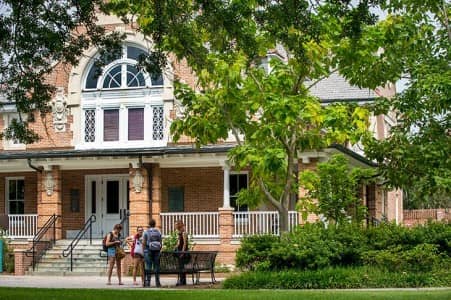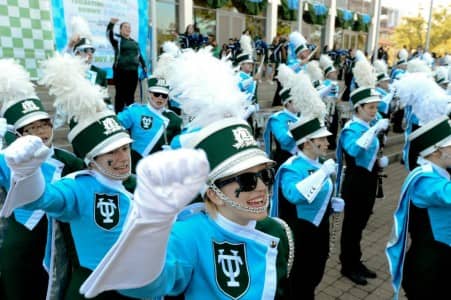Tulane University
New Orleans, Louisiana
Tulane University is located in the picturesque city of New Orleans. The University is hailed for its research initiatives, as well as its commitment to developing students into leaders. Tulane’s motto, ‘Not for one’s self, but for one’s own,’ is an educational philosophy that drives academic and personal growth in a collegiate setting.
Get to know Tulane University
College Highlights
FIRST YEAR EXPERIENCE
Tulane’s first year program is known as TIDES, which stands for Tulane Interdisciplinary Experience Seminar. TIDES gathers students in small groups and promotes the exchange of ideas and bonding among peers. Tulane offers 70 different seminar courses, meaning students have countless options when it comes to selecting a class that speaks to their interests. In small groups, students learn by interacting. Faculty promote engagement with coursework and encourage students to work with one another.
STUDY ABROAD
The majority of Tulane students study abroad their junior year, although a handful of individuals go as sophomores. The average amount of time spent abroad is a semester, but that’s not to discourage students from studying an entire year. It’s even possible to study in two separate locations. Students wishing to pursue two separate abroad programs must demonstrate excellent academic records, as well as a valid reason for choosing two destinations. It’s important that students double check their program against the requirements of the major. Additionally, some programs have higher standards for G.P.As.
Pre-Departure Orientation: Once a student has been approved for their program they must attend a pre-departure orientation (PDO). The online PDO is an introduction to study abroad. Through a series of exercises, students learn about important policies and travel safety. The second PDO is specific to the country the student will be traveling to. Faculty prepare participants for departure and review expectations.
Housing Options Abroad: Not every program is designed the same. Housing options change across destinations. Student/University housing is like traditional apartment living. In this residence option, Tulane students are paired with students from other institutions. The other housing arrangement is called homestay, which involves students living with natives of the host country.
SERVICE LEARNING COURSES
Service Learning courses integrate academic concepts and theories into community service. Tulane offers several different courses, spanning across all disciplines. Some of the courses for Fall 2015 include:
- Orchestra: Students enrolled in this course act as mentors to elementary students. This is an opportunity for Tulane undergrads to share their passion for orchestral performance and instruction.
- Product and Experimental Design: This course is offered through the School of Science and Engineering. Participants in this class have the opportunity to help local middle school students with their science fair projects.
- Open Studio: The School of Architecture offers a course on planning for City Center Projects. This unique opportunity allows architect students to gain hands on experience in the area of study.
- Workshop in Creative Writing Journalism: This course, offered by the School of Liberal Arts, connects participants with students from New Orleans Charter Science and Mathematics High School. Together the two groups produce a bi-annual magazine.
ENROLLMENT BY ETHNICITY
Non-U.S. Citizen: 5%
Hispanic/Latinx: 8%
Black or African American, non-Hispanic: 6%
White, non-Hispanic: 69%
Native/Indigenous American or Alaska Native, non-Hispanic: 0%
Asian, non-Hispanic: 5%
Native Hawaiian or other Pacific Islander, non-Hispanic: 0%
Two or more races, non-Hispanic: 4%
Race and/or ethnicity unknown: 2%
CORE CURRICULUM
At the center of Tulane’s educational structure is the Core Curriculum. Within the curriculum, there are certain requirements that each student is expected to satisfy before they can graduate. The Core Curriculum is an experience shared by the entire student-body, no matter their college or discipline.
First-Year Writing (4 credits)
Effective communications skills will always be important. Not only is quality writing necessary for one’s college career, but it is a highly marketable skill in the eyes of employers. Tulane insists that each student complete a writing competency by the end of their freshman year. In order to move forward, students must take and pass English 1010. Students that have received a 4 or higher on the Advanced Placement test can bypass this requirement.
Foreign Language
All students must take a foreign language and demonstrate their understanding of that language by passing level 1020 or higher. Languages cannot overlap and count for something else. Individuals in the School of Liberal Arts or the School of Public Health have different standards regarding language have to study for an additional semester. Students in pursuit of a Bachelor’s of Science in Engineering are exempt from the foreign language requirement.
Scientific Inquiry (9-12 credits)
(3-4 credits must be Quantitative Reasoning) (6-8 credits must be Science and Mathematics).
Examples of these courses include: Cell and Molecular Biology, Physics, and Astronomy.
Cultural Knowledge (12 credits)
(At least 3 credits in Fine Arts, at least 3 credits in the Humanities, and 6 credits in Social Sciences). Of these 12 credits, 1 course must be a survey of Western tradition and 1 course must be outside Western tradition.
- Examples of Fine Arts courses include: Art History, Architectural Visual Media, and Music.
- Examples of Humanities courses: Philosophy, Communications, and Classical Studies.
- Examples of Social Science courses: Anthropology, Economics, and International Development.
Public Service
The Public Service requirement is a unique element of Tulane’s curriculum. The University believes that service to the community is an integral part of the undergraduate experience. Students need to come to a place of understanding, where academics are utilized in order to make a positive change in the community. In order to satisfy this requirement, students must complete a service learning course and participate in a program approved by the Center for Public Service. Some examples of programs include: an academic service-learning internship, faculty-sponsored public service research, and a capstone experience with a focus on public service.
PUBLIC SERVICE FELLOWS PROGRAM
The Public Service Fellows Program trains students to act as leaders for on and off campus service initiatives. The program is worth four credit hours and counts toward the second portion of the graduation requirement. Public Service Fellows gain experience leading initiatives and developing solutions to community issues. Fellows also benefit from one-on-one interaction with faculty and community partnerships.
PUBLIC SERVICE INTERNSHIP
The Public Service Internship is ideal for individuals looking to draw connections between academics and service to the community. Participants benefit from hands on experience in and around the community. Students get to choose the organization they wish to work for and they can earn credit for their internship. In order to qualify for this program, students must be in their sophomore, junior, or senior year. They must also have completed the first portion of their Public Service Graduation Requirement. Lastly, students must have a 3.0 average G.P.A in order to be considered.
INTERNSHIPS
There are several internship opportunities available through Tulane. Students looking to secure a position should visit career services and make an appointment with an advisor. Some of the internships available include:
Africare: The Africare internship benefits Africa in four central areas: Agriculture & Food security; Health & HIV/AIDS; Water, Sanitation, and Hygiene, and Emergency Humanitarian Assistance. The Africare program last for 10 weeks over the summer.
County of Los Angeles Public Health: This internship is ideal for students interested in public health. Participants address specific issues facing and threatening the county of Los Angeles. Details regarding availability and duties can be found through Career Services.
Gulf Restoration Network (GRN): GRN internships focus on sustainability and preserving the Gulf of Mexico. There are different sectors for the internships including global warming and clean waters.
Admission
TEST SCORES
Required
FRESHMAN PROFILE
SAT Evidence-Based Reading and Writing
25th Percentile: 650 | 75th Percentile: 730
SAT Math
25th Percentile: 690 | 75th Percentile: 770
ACT Composite
25th Percentile: 30 | 75th Percentile: 33
ACT Math
25th Percentile: 27 | 75th Percentile: 32
ACT English
25th Percentile: 32 | 75th Percentile: 35
Tuition & Cost
Tuition: $54,766
Fees: $4,086
Room: $9,282
Board: $6,950
Contact Tulane University
Contact Admissions
admission.tulane.edu
(504) 865-5731
undergrad.admission@tulane.edu
Campus Location
6823 St Charles Avenue
New Orleans, LA 70118
(504) 865-5000



